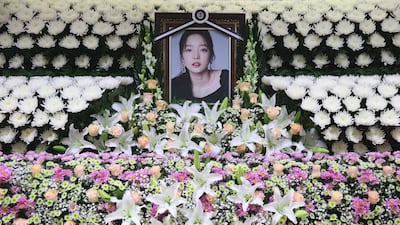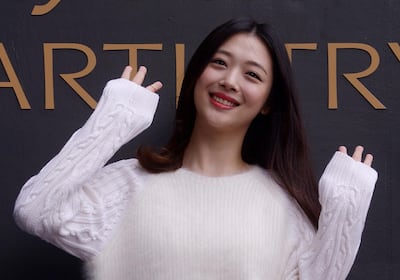Cyberbullying education could become compulsory in schools and private businesses in South Korea under new laws linked to the recent deaths of two K-pop stars.
Legislators in South Korea have begun pushing for the new bill after the death of South Korean singer and actress Goo Hara this week, and the death of fellow K-pop star, Sulli, six weeks ago. Hara's body was found in her home, where police say they also found a "pessimistic note". She was 28.
Hara debuted in 2008 as part of the five-member girl group Kara, which shot almost immediately to fame and helped pioneer the K-pop global phenomenon.
She later launched a successful solo career in South Korea and Japan.
Hara's death came less than two months after the high profile death of Choi Jin-ri, or Sulli, another K-pop star and Hara’s close friend. The tragedies have shone a light on the cut-throat world of K-pop stardom and the pressure heaped on stars of the genre.
Sulli was a rare taboo breaker in a world where K-pop stars' every move is strictly monitored by their management, but her death exposed the dark side of the industry that propelled a global craze.
She unveiled her romantic relationship at the height of her career as a member of top girl group f(x) and was vocal about not wearing a bra, defying both the K-pop world's careful brand management and conservative social attitudes towards young women – and provoking a stream of online comment.
Before her death, the 25-year-old spoke out strongly against cyber bullying. Police later said she had been suffering from severe depression.
"She wasn't just an issue-maker but I hope she will be remembered as a women's rights activist who was free-spirited, who could truly speak her mind," said Kwon Ji-an, a fellow South Korean singer and painter.
Kwon, 35, better known by her stage name Solbi, was also subjected to cyber insults in 2009, when she was a member of K-pop group Typhoon, after being wrongly identified in a video that went viral online.
The incident triggered intense depression, social phobia and panic disorder, Kwon said.
Kwon called for a change in the anonymous comment culture on the Internet, which critics has long blamed for cyber bullying.
In South Korea, local web portals such as Naver and Daum are a major channel of news consumption, which allow users to leave comments without revealing their real names.

K-pop is highly competitive, with dozens of groups debuting each year. Industry experts have long warned about the dark side of the scandal-ridden industry. Aspiring artists, as young as their early teens, train for years. Only a few debut and even fewer are commercially successful. The likelihood of their success increases if they sign with a handful of top entertainment agencies.
The industry is known to have strict rules for its stars – including dating bans, spartan training and diets, and sometimes highly-restrictive contracts. Experts say the industry has additional requirements for its female artists, unspoken rules reflective of South Korea's patriarchal society.
If passed, the cyberbullying law, which is being spearheaded by Kim Su-min from the centrist Bareunmirae party, would be named after Sulli.


